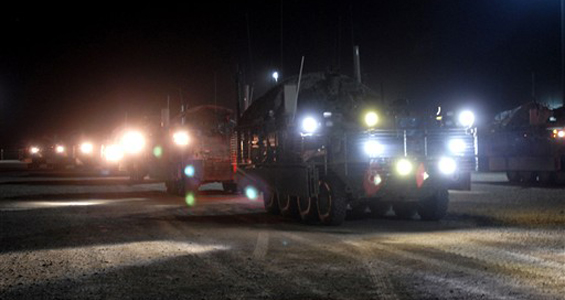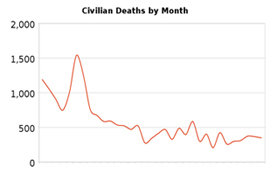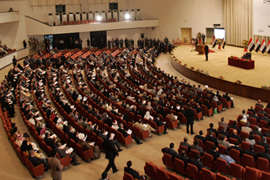Smaller presence, smaller influence
US influence, and its ability to solve Iraq’s intractable problems, is dwindling.

 |
| Thousands of US soldiers remain in Iraq despite the withdrawal of the final combat brigade [AFP] |
A long convoy of Strykers – heavily-armoured combat vehicles – rolled across the Iraq-Kuwait border in darkness early on Thursday morning, carrying the last batch of US combat troops serving in Iraq.
It was hardly a withdrawal, since Iraq remains very much occupied. A residual force of roughly 56,000 US troops will not leave the country until the end of 2011.
Called “advise-and-assist brigades,” they will train and conduct joint missions with the Iraqi security forces. But they are fully armed and authorised to defend themselves – “combat troops” in all but name.
A small contingent of US troops, probably several hundred, will likely remain in Iraq even after 2011 to provide technical assistance.
Still, the US drawdown is a milestone, the latest step towards ending the US occupation.
With the US’s smaller military footprint comes reduced influence. Iraqis still endure persistent insecurity and a battered economy, problems that Washington seems to have little ability to resolve.
Resurgent insurgents
Iraq’s “new normal” is a simmering insurgency that kills more than 250 people each month, many of them civilians.
 The monthly death toll in Iraq still remains above 250 (click to enlarge)
The monthly death toll in Iraq still remains above 250 (click to enlarge)That top-line figure is substantially better than the worst days of 2006 and 2007, when dozens of people were slaughtered each day.
But Iraq’s insurgents are increasingly active – violence in July was the worst it has been in more than two years – and their attacks have become more focused, targeting the institutions of the state.
Tuesday’s deadly attack at an army recruiting centre, which killed at least 57 people, was the latest example.
A wave of attacks this year has targeted the security forces (with a recent focus on traffic police) and the Sahwa, the Sunni militias formed to combat al-Qaeda in Iraq.
The strategic implications of these attacks remain unclear, although they clearly serve to undermine public confidence in the security forces. Iraqis often accuse them of incompetence and corruption.
Broken promises
In a September 2003 speech, then-president George Bush promised to rebuild Iraq.
“We will help them to restore basic services, such as electricity and water, and to build new schools, roads, and medical clinics. This effort is essential to the stability of those nations,” he said.
That promise remains largely unfulfilled, despite the tens of billions of dollars being spent (and often misspent) on reconstruction efforts.
Take electricity, for example. Iraq’s electricity production has expanded more than threefold since the war began, from 2,500 megawatts in late 2003 to roughly 8,000 megawatts today, according to the United Nations.
But demand has also exploded: Iraqis need more than 12,000 megawatts of power, up from about 6,000 when the war began.
The gap between supply and demand has remained relatively constant, at around 45 per cent.
Many other projects remain incomplete. The New York Times reported in July on a planned sewage treatment facility in Fallujah. American reconstruction officials started working on the plant in 2004; after six years and more than $100 million, they decided to abandon the project half-finished.
A litany of other economic indicators paints a grim picture. Unemployment stands at 15 per cent, and at 30 per cent for Iraqis under the age of 25. Nearly one-fourth of the country lives below the poverty line. The growing illiteracy rate now stands at nearly 18 per cent of the population.
Political stalemate
Iraqis went to the polls 165 days ago, but their elected leaders have yet to form a government. In fact, they are now closing in on the world record for the longest government formation: 208 days, set by the Netherlands in 1977.
 US politicians have had little success mediating Iraq’s months-long political stalemate [AFP]
US politicians have had little success mediating Iraq’s months-long political stalemate [AFP]There are few signs that months of haggling will come to an end soon. The country’s two main blocs, Iraqiya and State of Law, broke off negotiations earlier this week; each is now courting smaller parties, but neither is close to the 163 seats required to form a coalition.
Jeffrey Feltman, the US assistant secretary of state for near eastern affairs, is in Iraq this week on a lengthy visit to meet with Iraqi officials. He acknowledged that the US has little capacity to impose a government on Iraq.
“If there is a possibility to form the government based on these two blocs with the participation of the other blocs, [that] would be something good, but we do not have the right to take this decision,” Feltman said.
The US will continue to exert influence over Iraq – particularly its regional standing – via the Strategic Framework Agreement, which governs long-term political and economic ties between the two countries.
It also plans a major civilian commitment to Iraq after 2011, with hundreds of staffers from the US state department and other agencies.
But the political deadlock, ongoing insurgency and unfulfilled economic promises suggest that America’s ability to shape events inside Iraq continues to dwindle.
Perhaps the most incisive take on the US drawdown came from the US satirical newspaper The Onion, in a cuttingly honest article headlined “Obama Declares Victory, Sort Of, Depending On How You Look At It, In Iraq.”
“The relative victory could be credited to a number of achieved benchmarks, depending on how strict one’s definition of ‘achieved’ is,” the paper wrote.
“The democratic election of an Iraqi parliament currently being held together by a thread; the streets of Iraq being slightly less hellish than they were in 2006…”